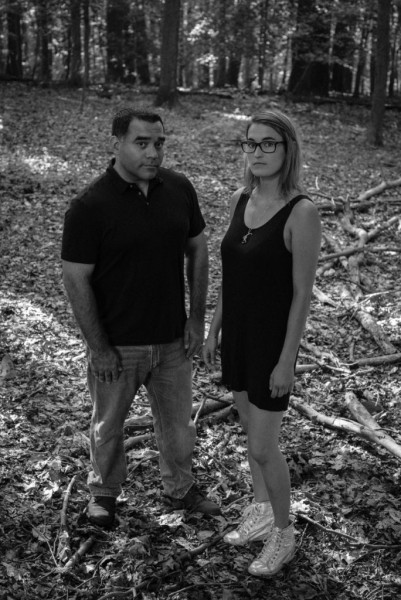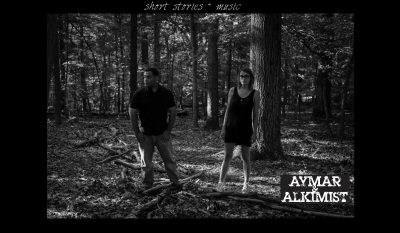
What’s cooler than flash fiction? Reading it out loud and pairing it with music. Writer E.A. Aymar, a past guest editor here at SmokeLong, and Kimberly Venetz (DJ Alkimist) have partnered on a new project mixing flash and music for amazing effects. The two are also planning on performing live at select events. SmokeLong Editor Tara Laskowski chatted with them about the venture and what they hope to achieve.
Tara: Where did this idea come from?
EA: It’s been a complete collaboration from the start.
I run D.C.’s Noir at the Bar series and thought it would be cool if we had a musical component, so I looked up area DJs and really liked Kim’s (DJ Alkimist) work. We started trading e-mails and she mentioned she enjoyed crime fiction. I told her about my interest in working with musicians, specifically my readings where local jazz musician Sara Jones had provided accompaniment. Then Kim told me about the music she’s produced on her own, and I listened to her tracks and mixes and learned that, while Kim’s mixes could absolutely get a club bouncing, she also produces this deeply personal beautiful music, and it dug deep down into my bones.
I wanted to write to it.
So she and I kept talking about collaborations and getting excited, and I think we both started to realize this could be something unique.
DJ: I had been quietly producing my own weird little tracks as a side project from my DJing and performing and Ed suddenly fell into my world. It just took off from there. No one has ever approached me about doing something like this, so naturally, I was intrigued.
Tara: How does the process work? Do you write the story first, then add music? Or select music and then write a story that fits that mood? Does it vary? It reminds me of those call and response projects between writers and visual artists, and I’m always interested in that collaborative process.
EA: That’s a really thoughtful question and this is going to sound dickish, but I don’t like discussing process. I will say this. The Norwegian playwright Henrik Ibsen used to get thanked by actresses for creating such wonderful characters for them to play. When I first heard Kim’s music, and when I hear her new music, I understand that reaction.
And that’s something Kim and I have discussed—why we vibe. I’m a fairly straightforward writer, especially when it comes to giving a reading. I think it’s because I suck at listening to readings, and complex oral stories confuse me. When I write for a reading, I want the story’s complexity to be almost entirely emotional, under the surface, rather than twisted into the plot. Similarly, the music Kim creates (that speaks to me the most) has an easily recognizable surface, but it’s so emotionally and musically layered that, upon repeat listenings, I keep discovering more.
DJ: Ed put it best when he talked about how we vibe. Because it’s really all about that. And a little bit magic. Our writing styles are very compatible, and as Ed said, we create a whole lot of emotional complexity under the surface. We want it to linger with you.
EA: Check out Kim’s track “Silence,” for an example of a slow, heartbreaking piece of music that’s deceptively complex. You think you’re just listening to a few notes, but other elements are slowly brought in that deepen it significantly, and it transitions so subtly and smoothly that all of a sudden you’re like, “Hey, is that a bird?” And, crazily, it works, and the somber mood of the track is maintained. I don’t know how she does what she does.
 Tara: Is flash fiction the perfect form for this kind of thing? Any plans to attempt a longer piece in the future?
Tara: Is flash fiction the perfect form for this kind of thing? Any plans to attempt a longer piece in the future?
DJ: If we decide we don’t want a story to be a standalone piece, then it makes more sense to keep the stories relatively short and weave them all together using music or similar themes. My DJ side can easily hear how all the songs can be blended into a longer piece, like a DJ set or a mix tape, with no dead time. Also, from a musical perspective, keeping the songs short helps me edit and make sure each phrase of my piece is important and not just filler.
EA: I like to keep readings to about five minutes or less, which is probably around the average length of the song. I wouldn’t mind going longer, but Kim’s right; a longer form would be different than that idea suggests. To put it in writing terms, I think longer would work better as a series of interconnected stories or novellas, rather than one fat novel.
Tara: How long does it take to complete one pairing? How many “takes” do you need to do? And on that note, any mistakes you made or lessons you learned along the way?
EA: Probably a month. We didn’t do need to do a lot of takes for “You Would Have a Queen” because I practiced it so much. I rehearsed it over a hundred times, which is a lot more than I do for a typical reading.
One thing I’ve struggled with (and a lot of people do) is talking too fast. I try to slow down, but some of the tracks require a faster pace. So lately I’m all about enunciating. That’s kind of my new thing.
DJ: I had no idea Ed practiced it a hundred times; I just assumed he was pro.
EA: Sucker.
Tara: What do you think combining these two forms does to elevate each?
DJ: OMG, I could probably talk about this idea for hours (but don’t worry, I won’t).
I think music adds life and depth to everything. Try to picture a commercial, or a scene from your favorite movie, or eating at a restaurant, or anything, and think about how you feel when there’s music accompanying that scene versus silence. But I’m not knocking silence; silence is powerful in its own right.
I think sometimes our mind wants to hear the music of a scene anyway, just as sometimes it wants to verbally express the story that seems to manifest from a piece of music. And music affects our brain in ways we are only beginning to understand. If you were to hear a story with its own soundtrack, it’s going to affect how you feel and interact with that story, even if you’re not directly paying attention to the music, and vice versa. I also believe that language is the shortened version of music. They’re just different methods of communication.
If I write a track, I’m trying to communicate something with it. But I’m not the best with words. Ed’s stories ground my songs and give them form and direction, a certain life. It’s a relationship of reciprocity. And the result is something of beauty, emotional complexity, uniqueness, and a whole lot more.
EA: Well, shit, I can’t beat Kim’s answer. But I’ll just add that I make a conscious effort to keep the written piece a short story. It intentionally lacks the cadence or style of rap or a poem, although I borrow elements from each of those forms.
We call this “short stories + music,” but that’s pretty much the same thing as a song or rap. To be different, the written element has to be identifiable only as a short story. So, although my stories follow the rhythm of Kim’s music, and the two play with each other, I’ll occasionally ignore measures just to break rhythm.
Tara: Ed, you’re a crime/noir writer primarily, but it seems to me that most any style or genre could work for this kind of project. Do you have any plans to accept submissions from or solicit other writers?
EA: No, DJ Alkimist is awesome and she’s mine. Stay away everyone. For real, fuck you.
Kidding. We have a couple of upcoming projects where we’re working with other writers in different ways. I usually don’t collaborate with writers, so it’s a little odd. Very much something I’m learning to do as I go. Writing, I’m a loner.
But if other writers wanted to work with Kim on their own, I mean, I guess that’s cool. She makes music that we don’t use for this project and performs on a regular basis. This is by no means all we do, and I expect each of us will be working on different projects in the future.
But this is something that I want to continue doing, and return to. Something about this burns.
DJ: I’m a Scorpio and therefore also fiercely loyal. I have no plans at the moment to collaborate with other writers besides Ed and the peeps we bring in on this project. But I’m also a pretty open-minded person. And I’m always open to submissions of really delicious raw food recipes.
EA: Ha!
Tara: Everyone always says they hate the sound of their own voice. Do you?
EA: Yes, it’s awful. I worked with two people: a voiceover artist and singer named Art Tiller; and the writer Kim Alexander, who has a background as a radio host. They assured me that my voice was fine. I doubt it. I’m pretty sure everyone I asked was lying to me and I sound terrible. Hopefully the music and stories are so good that no one notices.
DJ: I know this question’s not for me, but can I just say that I’ve always thought Ed had a great voice?
EA: Aw. But, for real, it needs to be, like, fifteen percent raspier. I’ll probably start smoking. You know, for art.

 Included in the price of SmokeLong Fitness:
Included in the price of SmokeLong Fitness: